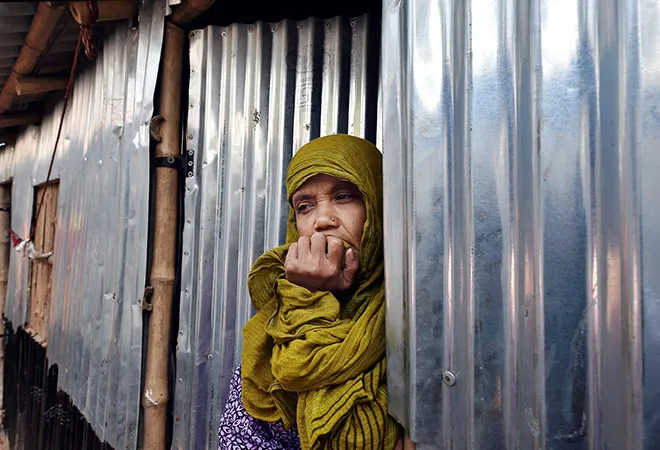
This article is part of the series — BIMSTEC in 2021.
The Bay of Bengal is a strategic location brimming with infinite potential yet to be tapped. The Bay of Bengal Initiative for Multi-Sectoral Technical and Economic Cooperation (BIMSTEC), comprising of the seven member states of South and Southeast Asia, is a distinctive subregional initiative in terms of both its political geography and proximity to the Bay. Being dormant for more than two decades since its formation, it is only in recent years that the subregion awoke towards the requirement of enhancing their regional commitment. Part of this realisation has been due to the overflowing eminence of the maritime space. Additionally, the subregion started gaining thrust, post the stagnation of the South Asian Association for Regional Cooperation (SAARC), which ambushed much of India’s economic stakes in the region. However, there is growing concern among several spectators that unless the current diplomatic ties between Bangladesh and Myanmar progress, the BIMSTEC initiative may suffer the same fate as SAARC.
Barring Bhutan, the Bay littorals including the landlocked Nepal, have given asylum to a substantial number of these displaced people.
The Rohingya crisis has been one of the most contentious issues of recent times. Due to persecutions faced in Myanmar, where they are considered stateless due to the Citizenship Act of 1982, these displaced people have migrated within the subregion throughout the last decade. This resulted in their growing numbers within the BIMSTEC nations. Barring Bhutan, the Bay littorals including the landlocked Nepal, have given asylum to a substantial number of these displaced people. Bangladesh currently possesses the highest number of these hapless people and is desperate to reopen negotiations in order to repatriate the said population to Myanmar at the earliest. However, two failed repatriation efforts and unproductive dialogues have led to growing discord between Myanmar and Bangladesh, the two key members of the BIMSTEC subregion.
The ongoing diplomatic row may seem to not only jeopardise the promising BIMSTEC initiative, but also the future of India’s “Act East” policy, and Thailand’s “Look West” plan. Bangladesh and Myanmar form a vital land bridge between South and Southeast Asia. A number of physical projects are in line for the same. The accomplishment of these projects is contingent on Myanmar’s assistance. More significantly, it will depend on how it proceeds to settle its divergences with Bangladesh on the Rohingya issue. While the said topic seems long drawn, it’s worth a look if BIMSTEC as a multilateral organisation can help resolve this pertinent matter.
The ongoing diplomatic row may seem to not only jeopardise the promising BIMSTEC initiative, but also the future of India’s “Act East” policy, and Thailand’s “Look West” plan.
If we look closely, the organisation as a whole is meant for technical and economic cooperation and does not probe in areas where there is no parity between the member states. The BIMSTEC Secretariat has posited in several of its summits that the multilateral forum is receiving an immense boost as it concentrates on cooperation. Nevertheless, it has not skipped one’s gaze that the Myanmar government has undermined BIMSTEC’s own mandate of “peaceful coexistence” among the member states. But it is quite astonishing that not a single member nation seems to raise this concern.
However, the BIMSTEC summit or Secretariat may not be able to set aside the issue for long and may take it up as and when Bangladesh formally approaches to address it. The constructive approach applied by India and others is necessary to ensure the prosperity and development of the Rakhine State so that it becomes economically and reasonably viable to take back the displaced Rohingyas. Still, the security aspect needs to be measured. The constant ethnic contrabands as well as radicalisation within the Rohingya group remains a worrying concern. In this regard, the national security advisors may play a role as and when they become functional. In this regard, India being a prominent player may nudge its members to ratify regional security cooperation that will ensure the proper functioning of the security apparatus between each member state and enable information sharing in real-time.
The constructive approach applied by India and others is necessary to ensure the prosperity and development of the Rakhine State so that it becomes economically and reasonably viable to take back the displaced Rohingyas.
Another major aspect which BIMSTEC member states need to look into is that the countries within the subregion are not a party to the 1951 Refugee Convention or its 1967 Protocol. This results in not providing any concrete steps for safeguarding or providing basic rights to such stateless populations. In addition, a refugee and asylum policy will help include guidance for action to be taken when a member state’s internal issues cause people to flee to neighbouring states. Such a policy agreed by all BIMSTEC members would further help to ease both the escalation of opposition and any future ethnic or religious tensions between member states.
One needs to understand that the continuing Rohingya crisis has shown how little the subregion is equipped to deal with such a movement of displaced people from one member state to another. As we move into 2021, the situation will require close monitoring if better subregional cooperation is to lead to improved protection for its displaced or stateless people. Therefore, it is vital for the subregional forum to give the matter the due significance it deserves.
The views expressed above belong to the author(s). ORF research and analyses now available on Telegram! Click here to access our curated content — blogs, longforms and interviews.




 PREV
PREV


